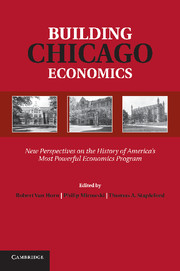 Building Chicago Economics
Building Chicago Economics The Workshop System and the Chicago School’s Success
from Part Two - Constructing the Institutional Foundations of the Chicago School
Published online by Cambridge University Press: 05 November 2011
What accounts for the remarkable success of the Chicago School of Economics in the postwar period? In his recent book, The Chicago School, Johan van Overtveldt argues that the answer to that question has five key ingredients: “a strong work ethic, an unshakable belief in economics as a true science, academic excellence as the sole criterion for advancement, an intense debating culture focused on sharpening the critical mind, and the University of Chicago’s two-dimensional [i.e., geographic and academic] isolation” (Van Overtveldt ). Others will argue that his answer deemphasizes some essential external ingredients in the School’s success: For example, the ability of Chicago economists to put socialism on the ideological defensive has been emphasized both by those who see the School as an effective defender of classical liberalism (Friedman ) and those who see it as the initiator of a new rationalization of democratic capitalism – neoliberalism (Amadae ; Van Horn ). Although the argument about external-element contributors to the School’s success is important, I will focus, like Overtfeldt, on its internal conditions. However, unlike Overtveldt, I will focus on the institutional infrastructure that supported that success rather than the individual brilliance of its faculty and the cultural conditions – such as the work ethic, a debating culture, and common beliefs – to which Overtveldt ascribes its success. Setting aside the issue of whether Chicago’s economists were naturally more brilliant than others (a claim I doubt), the cultural conditions Overtveldt attributes to the Chicago School will be seen here as the consequence of the institutional infrastructure that was built in the postwar era in the department of economics at the University of Chicago, not its cause.
T. W. Schultz, head of the Department of Economics at the University of Chicago from 1946–1962, believed that research success was not the product of a string of coincidences, but rather the result of a favorable and efficient organizational context (Teixeira 2008). Under his watch, the Chicago School built an institutional infrastructure that is often called the “workshop system.” Chicago’s famous workshops are often misunderstood as simply a variant of the seminars that are part of every economics department’s life today; from this perspective, the fact that everyone has seminars, and that Chicago’s were particularly successful, suggests that it must be the combination of the unique atmosphere of the university and the individuals involved that explain the School’s success. I will argue, however, that Schultz’s instinct was right: The workshop system, initiated in the late 1940s and early 1950s and built on the department’s existing teaching of a set of “tools of analysis” in price and monetary theory and statistics/econometrics, created an integrated framework for research and teaching that enabled the expansion of the Chicago approach to economic science across the disciplinary spectrum (and eventually beyond). To use Kuhnian language, the workshop system provided the means for the normalization of the Chicago paradigm. The workshop system’s success as a means for normalizing science is no mistake; as we will see, part of its roots lie in the attempt to design a laboratory for applied economic research. For the scientific community of economics, the ubiquitous presence of the Chicago approach is as sure a sign of its dominance as “normal science” as the number of its Nobel laureates.
To save this book to your Kindle, first ensure [email protected] is added to your Approved Personal Document E-mail List under your Personal Document Settings on the Manage Your Content and Devices page of your Amazon account. Then enter the ‘name’ part of your Kindle email address below. Find out more about saving to your Kindle.
Note you can select to save to either the @free.kindle.com or @kindle.com variations. ‘@free.kindle.com’ emails are free but can only be saved to your device when it is connected to wi-fi. ‘@kindle.com’ emails can be delivered even when you are not connected to wi-fi, but note that service fees apply.
Find out more about the Kindle Personal Document Service.
To save content items to your account, please confirm that you agree to abide by our usage policies. If this is the first time you use this feature, you will be asked to authorise Cambridge Core to connect with your account. Find out more about saving content to Dropbox.
To save content items to your account, please confirm that you agree to abide by our usage policies. If this is the first time you use this feature, you will be asked to authorise Cambridge Core to connect with your account. Find out more about saving content to Google Drive.